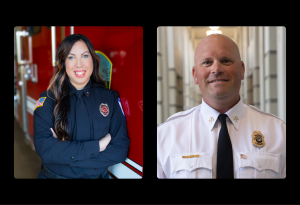Contributed by Nicholas E. Blonien, D.O.
Firefighting is a high-stress job that is highly rewarding, but it can certainly take a toll on fire service members’ health and well-being. When you add up the sleep deprivation, physical exertion and toxic exposures, it can be harmful and cause “free radicals” to form in the body.
Free radicals are molecules that can disrupt cellular function and DNA if not appropriately neutralized. Over time, this excess oxidative stress can increase your risk for cancer, chronic disease and accelerated aging. The good news – there is a way to neutralize free radicals and prevent them from causing harm: antioxidants.
What is oxidative stress?
Oxidative stress happens when free radicals damage cells. Free radicals are short-lived “reactive oxygen species” (ROS) that have an unpaired electron in their orbit. This makes them unstable molecules that try to “steal” electrons from other molecules in order to stabilize themselves. During this process, neighboring molecules will either become dysfunctional or turn into free radicals, too. While free radicals are a normal part of our body processes and even deployed by the immune system to help fight infections, too many of them can cause problems.
Stress overload
When the body faces too much stress, it can struggle to neutralize free radicals and keep them under control, which can cause damage or unwanted ailments. That’s why it’s important to have a plan to boost antioxidants, especially in times of intense physical activity, exposure to toxins or poor nutrition.
How to boost antioxidants
Two common-sense ways to boost antioxidants in your body include:
Exercise – While physical exercise can temporarily increase stress and free radical formation, it strengthens antioxidant activity over time. Regular exercise causes the body to adapt and become better at handling stress.
Nutrition – The best way to get dietary antioxidants is by eating fruits and vegetables. Diets that limit these foods, such as the ketogenic diet or carnivore diet, are not recommended as a long-term or sustainable nutrition strategy. Here are some great foods that are high in antioxidants:
- Fruits: berries, apples, cherries, pomegranates, tomatoes
- Vegetables: kale, spinach, broccoli, brussels sprouts, beets, carrots, sweet potatoes, beans
- Nuts/seeds: walnuts, pecans, almonds, chia seeds, flaxseed
- Extras: coffee, green tea, cinnamon, turmeric, oregano
The above list is NOT exhaustive. There are MANY foods packed with antioxidants.
To stay healthy, it’s important to neutralize free radicals with antioxidants. You can do this by getting enough sleep, exercising regularly and eating a diet full of fruits, vegetables, nuts and seeds.
How can I learn more?
MnFIRE offers professionally led training sessions on sleep, nutrition and fitness, as well as occupational health risks including cancer, cardiac and emotional wellness. Click here to learn more and register your department for a no-cost training and help strengthen your team from the inside out.








